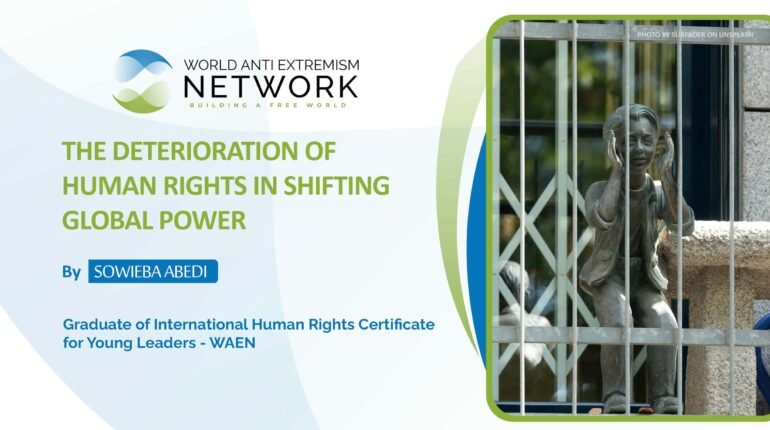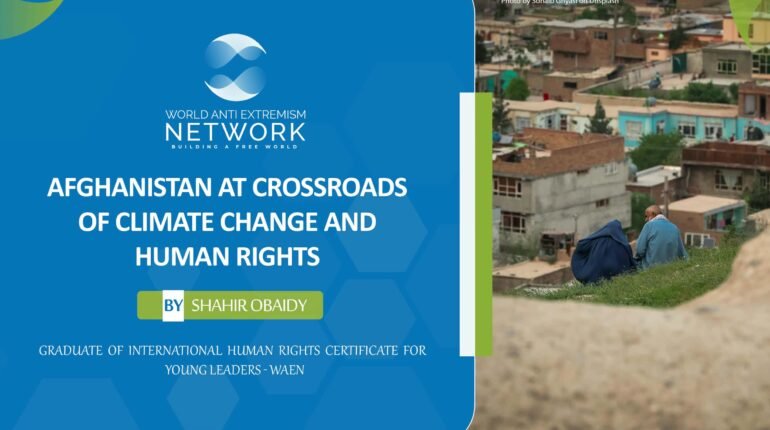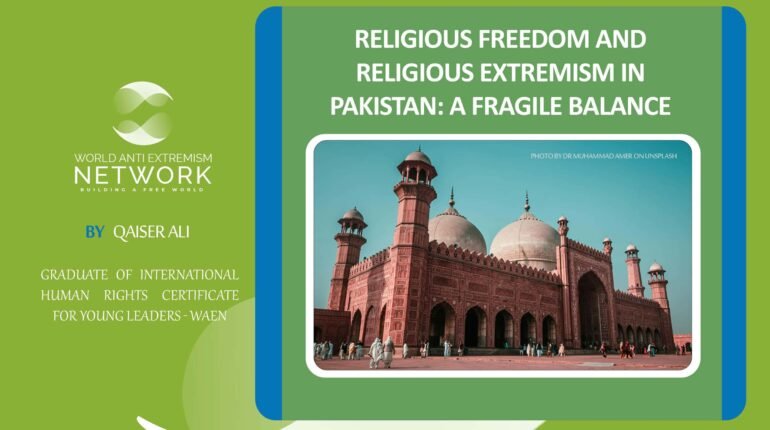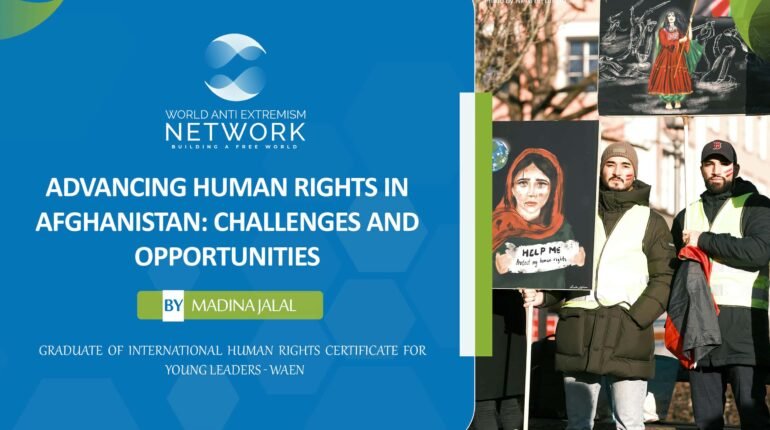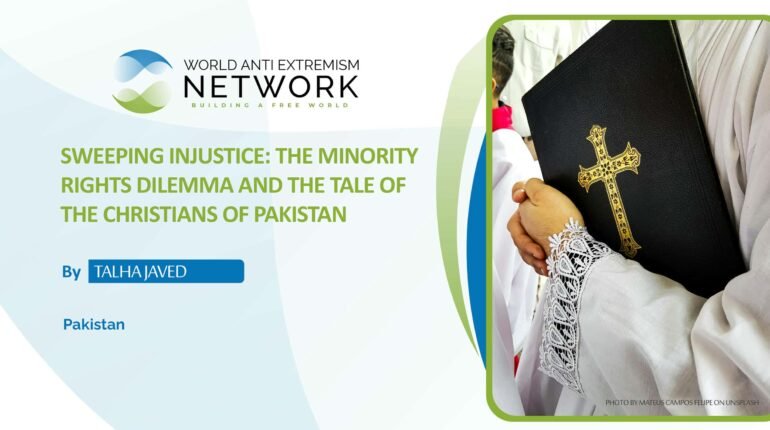FROM DIGNITY TO STRUGGLE TRANSGENDER RIGHTS IN PAKISTAN
- World Anti Extremism Network
- FROM DIGNITY TO STRUGGLE TRANSGENDER RIGHTS IN PAKISTAN
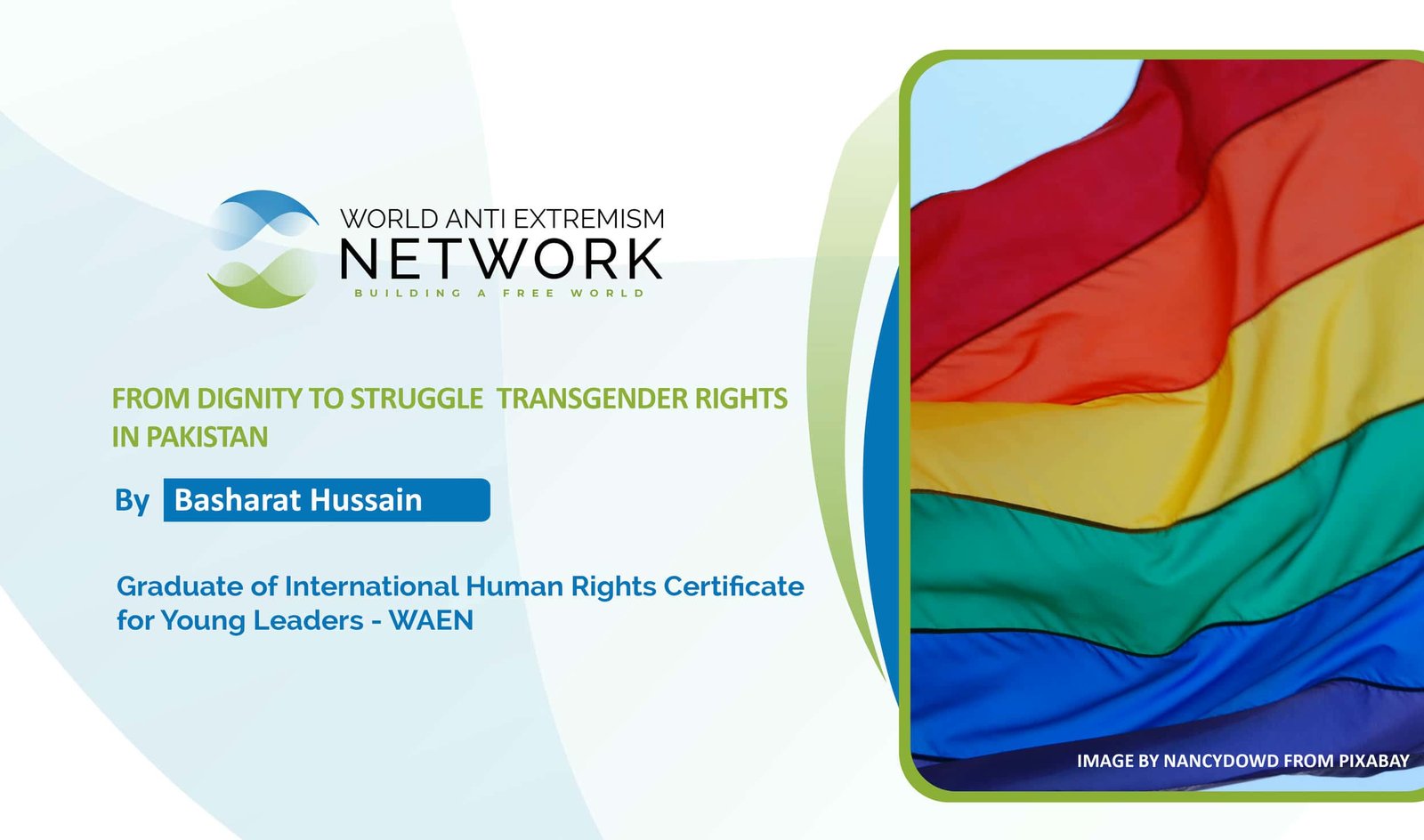
Historically, transgender individuals in the subcontinent held unique cultural roles, often recognized within society for their participation in ceremonies, arts, and even advisory roles in royal courts. Known as “khawaja sira,” this community has roots in South Asian history that go back centuries, with members often respected for their distinct identity. With the advent of colonial laws and later the formation of Pakistan, transgender individuals began to face increasing marginalization and discrimination. The social and legal status of transgender people deteriorated, leading to exclusion from most sectors of society, including education, employment, and healthcare. At the time of Pakistan’s inception, the nation’s founding principles advocated for inclusion and equality, as stated in Muhammad Ali Jinnah’s vision of a state where everyone was “free to go to their temples, mosques, or any place of worship,” and where religious and social identity should not interfere with rights. Yet transgender individuals largely remained on the fringes, facing deep-seated biases and social exclusion. In 2018, Pakistan took a significant step by enacting the Transgender Persons (Protection of Rights) Act, which guarantees the rights to self-identify, inheritance, and employment. This act reflects a national commitment to inclusion and protection, but implementation has been uneven, and many members of the transgender community are still socially excluded in Pakistani society. They experience high levels of physical abuse and face discriminatory behavior in daily life, often being pushed into commercial sex work, begging for substance abuse, and even suicidal ideation. In Khyber Pakhtunkhwa (KP) the government has started recognizing the need for targeted programs and support for transgender communities. Small but meaningful efforts include establishing transgender-specific healthcare services and vocational training programs.
CURRENT STATUS OF TRANSGENDER
According to the 2017 Pakistan census, the transgender population is estimated to be around 0.3%, although exact figures are hard to determine due to widespread stigma and discrimination. In Khyber Pakhtunkhwa, the transgender population, according to the Pakistan Bureau of Statistics, is about 0.01%. Despite the Transgender Persons (Protection of Rights) Act 2018, many government officials and law enforcement agencies remain ill-informed about the rights guaranteed under this law. Reports from local human rights organizations indicate that transgender people often encounter discrimination when seeking medical care or legal assistance. Many healthcare providers refuse to treat transgender patients, further exacerbating their marginalization. In 2023 and early 2024, several alarming incidents highlighted the ongoing struggles faced by transgender people in KP. For example, in early 2024, a transgender individual was brutally attacked in a public space, igniting protests from activists demanding better protection and accountability from authorities. This incident, along with others, underscores a broader climate of fear and vulnerability for transgender individuals in the province. The phenomenon of forced conformity persists, as many transgender individuals feel pressure to conform to societal norms, often leading to mental health crises and social isolation. Activists report that public awareness about transgender rights remains low, and societal acceptance is hindered by deeply entrenched cultural stigmas.
INTERNATIONAL PERSPECTIVES ON TRANSGENDER ISSUES
International human rights organizations have raised serious concerns regarding the condition of transgender individuals in Pakistan, particularly in Khyber Pakhtunkhwa. The Amnesty International Report 2023 emphasized that “transgender people continue to face widespread violence, discrimination, and harassment,” highlighting the urgent need for protective measures and systemic reforms. The Human Rights Watch World Report 2023 echoed these concerns, stating that “women, religious minorities, and transgender people continued to face violence, discrimination, and persecution, with authorities failing to provide adequate protection or hold perpetrators accountable”. The UN Human Rights Council has pointed out that “transgender individuals remain particularly vulnerable to hate crimes, forced conformity, and social exclusion,” indicating a pervasive culture of violence against this community. Reports from local NGOs reveal that many transgender individuals encounter significant barriers when seeking legal recourse after incidents of violence or discrimination. Victims often fear victimization, leading to underreporting of incidents and a culture of impunity for perpetrators. The prevailing stigma against transgender people exacerbates their vulnerability and hinders efforts to promote their rights and well-being.
ISLAM, THE CONSTITUTION OF PAKISTAN, AND THE ROLE OF THE PAKISTAN GOVERNMENT ON TRANSGENDER RIGHTS
Islam, as a religion, places great emphasis on justice, equality, and the protection of individual dignity. The teachings of Islam advocate for the respect and protection of all individuals, regardless of their identity. The Quran states, “O humanity! Indeed, We created you from a male and a female, and made you into peoples and tribes so that you may get to know one another” (Quran 49:13). This principle is further supported by the teachings of the Prophet Muhammad (PBUH), who emphasized kindness and justice towards all individuals, including those marginalized by society. In the Constitution of Pakistan, the 1973 Constitution enshrines fundamental rights that should protect all citizens, including transgender individuals. Article 25 of the Constitution recognizes that all citizens are equal before the law and are entitled to equal protection. Article 36 explicitly states that “the state shall safeguard the legitimate rights and interests of minorities,” a clause that extends to sexual and gender minorities. The Khyber Pakhtunkhwa (KP) government has taken steps to acknowledge the rights of transgender individuals. In 2018, the KP Assembly passed the “Khyber Pakhtunkhwa Transgender Rights Bill,” which aimed to provide legal recognition and rights to transgender individuals in the province. This legislation was a significant step forward, as it formally recognized transgender people as a distinct category, allowing them to register their gender as “transgender” on official documents. The bill also aimed to ensure access to education, healthcare, and employment opportunities for transgender individuals, thereby addressing some of the systemic barriers they face. The Challenges, however, remain in the effective implementation of these laws. Reports indicate that many transgender individuals in KP continue to face violence and discrimination. There is a notable gap between policy and practice as societal stigma and a lack of awareness persist, often hindering transgender individuals from fully benefiting from the protections afforded to them by law.
PERSISTENT STRUGGLES WITH THE ONGOING CRISIS FOR TRANSGENDER RIGHTS IN PAKISTAN
Despite the legal recognition of transgender rights in Pakistan, systemic violence and discrimination against transgender individuals persist. While the Constitution guarantees fundamental rights, these remain largely unfulfilled due to entrenched societal stigma and cultural biases. Transgender people often face rejection from their families and are excluded from education and employment opportunities, pushing them into vulnerable situations that increase their risk of violence and exploitation. Incidents of mob violence targeting transgender individuals highlight the urgent need for effective law enforcement and protection. For example, in 2023, a transgender woman was brutally attacked in KP, reflecting the ongoing threat they faced. Calls for stricter hate crime laws exist, but revising legislation alone is insufficient without a corresponding shift in societal attitudes. A significant trust deficit between transgender individuals and state institutions further complicates matters, with many reluctant to report discrimination. Recent interventions by law enforcement, such as a police officer saving a transgender person from harassment in early 2024, indicate the potential for change, but these require adequate support and training. For meaningful progress, the KP government must promote public education, enforce existing protections, and collaborate with civil society to foster a safer and more inclusive environment for transgender individuals.
ACCORDING TO MY VIEW
According to my view, social exclusion is one of the many factors that are forcing the transgender community to indulge in inappropriate conduct/habits. Promoting accepting environments and decreasing gender-based prejudice is necessary to improve the adjustment of sexual minorities. Accommodating this group into the mainstream so that the element of social exclusion can be eliminated is very important. In my opinion, interventions aimed at increasing social inclusion, reducing gender-based discrimination, violence, and physical abuse, and facilitating access to quality medical care should be considered as part of a comprehensive approach to preventing risky behavior in trans populations
SUGGESTIONS FOR IMPROVING TRANSGENDER RIGHTS IN PAKISTAN
- The government and society should come together to create clear policies that emphasize the importance of every person’s life and rights.
- It’s important to make it clear that only courts can determine guilt or innocence, and this should be enforced from the top down.
- There should be strict consequences for individuals and groups that support or commit violence against transgender people.
- Politicians and government officials should work with religious leaders to address transgender issues so that religion is not used to justify violence.
- Public seminars and campaigns should be held across the country to educate people about transgender rights, targeting both cities and rural areas.
- Social media, news, and other platforms should be used to spread accurate information and combat hate speech against transgender individuals.
- Schools should include lessons about Pakistan’s diverse culture and values of peace and tolerance through literature and poetry, using examples from famous writers.
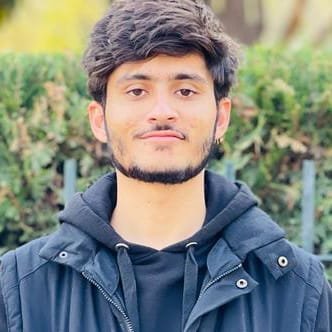
About the Author
Basharat Hussain is a dedicated psychology researcher and community advocate committed to improving mental health, social inclusion, and public well-being. With a Bachelor's degree in Psychology from the University of Peshawar, his work focuses on extremism prevention, mental health awareness, resilience, and social justice.Currently, Basharat serves as the Public Relations Secretary and Media Handler at the Pakistan Inclusive Psychological Society (PIPS), where he leads public awareness campaigns, organizes seminars, and promotes mental health education. Basharat has worked on various community initiatives, including drug rehabilitation programs with Dost Welfare Foundation, mental health interventions with ISPR, and research collaborations with UNOP on gender-focused surveys. He is also an advocate for human rights, particularly in the area of transgender rights and government policies.
The opinions expressed in these articles are solely those of the authors and do not reflect the views or positions of the organization. If you find any information incorrect, please contact (research@worldantiextremism.org), and we would be happy to assist you. You can download, distribute, and reuse this work, provided you credit the author and cite the original source.
Related Articles
Subscribe to our newsletter and stay updated.
Contact
Toronto, Ontario, M1L 0E5 Canada
Subscribe to our newsletter and stay updated.
Contact
Toronto, Ontario, M1L 0E5 Canada
Subscribe to our newsletter and stay updated.
Contact
Toronto, Ontario, M1L 0E5 Canada


